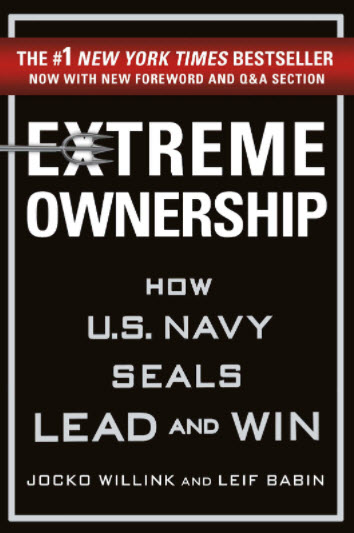How do you get everyone in your workplace on the same behavioural page?
A recent conversation with a local business leader led me to Extreme Ownership: How U.S. Navy SEALs Lead and Win.
 At first glance, I was reticent to read this book. Yes, the book was about taking ownership, full ownership, of your workplace. However, the book’s context was war. The workplace was the battlefield. The authors, who were battlefield commanders in Iraq, did not shy away from emotionally-charged opinions.
At first glance, I was reticent to read this book. Yes, the book was about taking ownership, full ownership, of your workplace. However, the book’s context was war. The workplace was the battlefield. The authors, who were battlefield commanders in Iraq, did not shy away from emotionally-charged opinions.
That said, I was glad to overcome my initial reticence. Over the years, I’ve discovered much by vicariously stepping into other worlds. I expect you have, too.
Building on insights offered up in Extreme Ownership, and my own, I came up with a set of principles to guide leaders, in their journey for better workplace relations. These principles won’t help you kill the enemy. Though, they may help you slay an internal dragon, or two.
12 Leadership principles for better workplace relations
- I take ownership, am accountable, for the behaviours in my workplace. Culture starts at the top.
- I manage for quality interactions and relationships as much as results and profits; 50:50 leadership.
- I promote constructive behaviours that deescalate conflict. Conflict is inevitable. How one responds to it, isn’t.
- I measure people on their behaviours, how well they align with our core values. Behaviours bring values to life.
- I don’t tolerate bad behaviour. I share our “jackasses” with the competition.
- I encourage open communication by ensuring psychological safety. Safety comes first.
- I view open constructive conflict as an opportunity, to learn and grow; a strategic advantage.
- I embed constructive behaviours into our employee hiring, assessment and development processes. Constructive behaviours are part of our cultural DNA.
- I build interpersonal skills competency in our workplace. Competency starts with increased self-awareness.
- I employ a continuum of conflict management options, reactive and proactive. I match the solution to the need.
- I get everyone on the same page. I ensure everyone, especially team leaders, understands why we are doing what we’re doing, and take responsibility.
- I know what people (especially millennials) want in the modern workplace. I attend to ethical and social priorities as much as financial priorities.
The perspectives offered up in Extreme Ownership largely aligned with my own story on why and how taking a more constructive approach to conflict is to your strategic advantage.
On Extreme Ownership
The authors of Extreme Ownership, Jocko Willink and Leif Babin, are hyper-aggressive and driven men. They are also smart and humble. (Humility is the most important attribute for being an effective team leader). That combination lends itself to a powerful message. The core of their message is one that can be adapated, with minimal reframing, to most workplaces.
Here’s a TEDx of Jocko speaking on the subject of extreme ownership:
(Video not displaying? Click here to watch it on YouTube)
Even in the darkest places, and horrors, of human relationships, war, we can learn a thing or two, and apply those to our own, more peaceful, places of work. Agreed?
[Ben Ziegler is a collaboration and conflict management specialist serving SMEs, nonprofits, and local governments. Contact Ben.]


Speak Your Mind